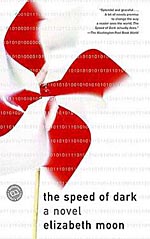
![]() everythinginstatic
everythinginstatic
4/13/2014
![]()
A novel of humanity, what it is that makes us "normal" and the lengths to which we'll go to fix and improves others, The Speed of Dark follows Lou Arrendale, an autistic man living in the near future, when diseases and mental illness can be identified and completely cured. Lou, however, is from the generation that received more support, but not the treatment to undo his autism. He and others like him, from this so-called "lost generation", still benefit from support -- until new management threatens everything they hold dear, if they don't agree to a revolutionary, as yet untested, treatment. Lou must now choose between his identity as an "autistic" and the chance that he might become normal.
The novel clearly comes from a place of love and experience, as Moon's own son is autistic. Some readers have compared this book (usually not favourably) to Flowers for Algernon, a book which tugged at the heartstrings as it follows the journey of a man who goes from being mentally disabled to near-genius levels. For me, The Speed of Dark was interesting in an entirely new way. I have depression, and I have sometimes wondered if I would take an option of being completely cured. Would it undo the years of progress in dealing with it and my anxiety? Would it fundamentally change who I am? These are the questions that Lou has to address throughout the novel.
The main perspective is Lou's, and it's fascinating to hear his thought process. To me, it really gives insight into what some autistic people think and feel and though not universally applicable, it is perhaps one of the most humane and realistic portrayals I've ever read. It is sympathetic, while also pointing out that some issues are annoying even to autistic people, that they have to do certain things in a certain manner, in the same manner that I find my anxious thoughts annoying and hard to explain or avoid. Other neurotypical characters pop in, but it is all Lou for the most part.
I did nearly end up knocking half a star off for the ending, because it felt genuinely rushed at times, and perhaps too cookie-cutter perfect, I guess? But the more I thought about it, the more I realised that, to an extent, I would want a future where diseases are eradicated. I would want to know that in the future, people would be able to choose whether or not to go through anxiety, depression, bipolar, autism or any of the other mental illnesses out there. It is a comforting thought, and I can understand why Moon would want to imagine that future. For those looking for sci-fi, the book doesn't really tap into the treatment, and there are a few questions about the near future setting that did puzzle me, but not enough to detract from my enjoyment of it. I enjoyed it for what it was, and it made me think about myself a lot more than the blurb let on I would. A really unexpected gem.